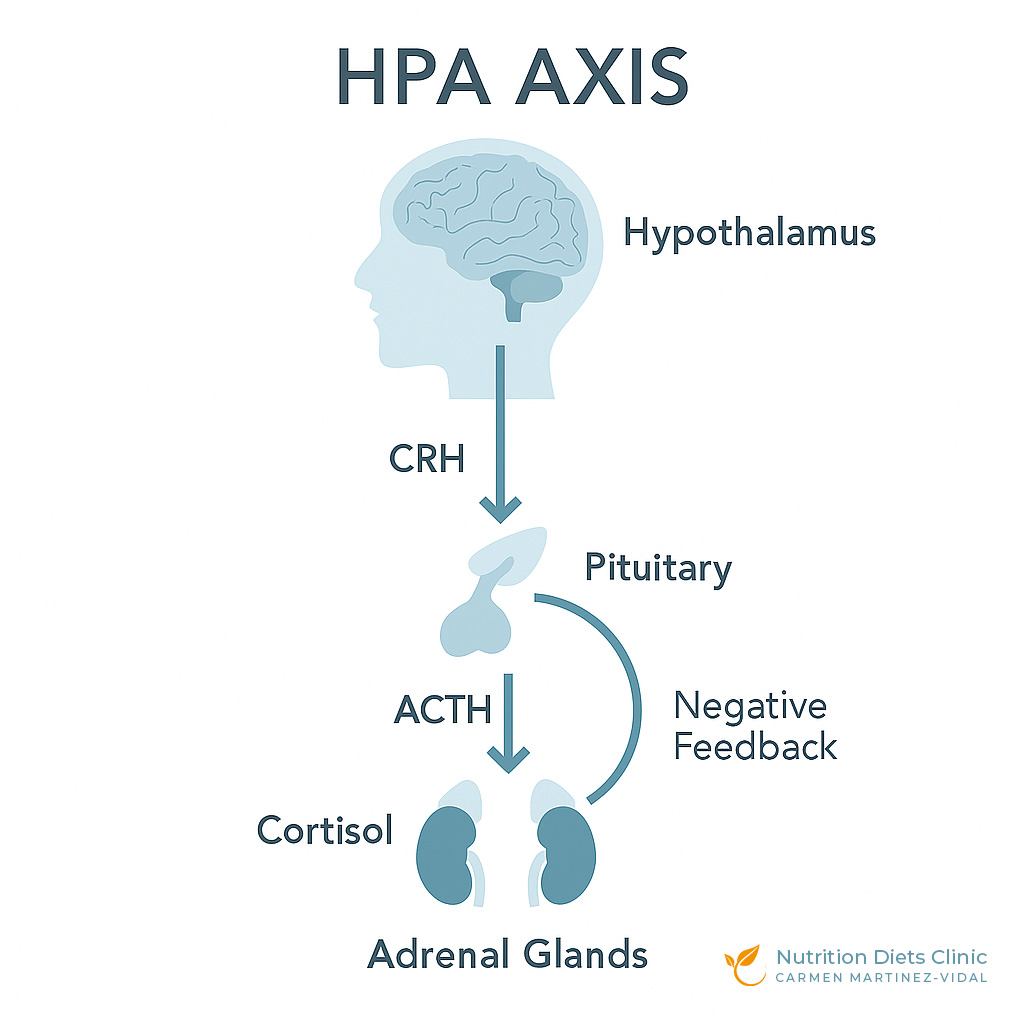In today’s fast-paced and digital world, chronic stress has become a silent driver behind many modern health concerns. Stress is more than just a feeling of being overwhelmed or rushed off your feet. It is a biological process that affects nearly every system in the body.
If you often feel wired but tired, anxious, struggle with poor sleep, or experience unexplained weight gain, it’s possible your stress hormones are out of balance.
In this month’s blog, we explore the deeper health implications of chronic stress from how it affects the HPA (Hypothalamic-Pituitary-Adrenal) axis, how cortisol dysregulation develops over time, and how a Functional Medicine approach can help support long-term recovery and resilience.
Chronic stress disrupts the balance and diversity of the gut microbiota, promoting gut permeability (“leaky gut”) and systemic inflammation — a key contributor to mood disorders and immune dysfunction.
Understanding the HPA Axis
The HPA axis stands for the Hypothalamic-Pituitary-Adrenal axis. It is a key communication network between the brain and adrenal glands that governs your response to stress. Here’s how it works:
-
The hypothalamus (in the brain) signals the pituitary gland
-
The pituitary gland sends messages to the adrenal glands (above the kidneys)
-
The adrenals release cortisol, your body’s primary stress hormone
This system is essential for survival. However, when the HPA axis is overactivated due to chronic emotional, physical, or environmental stress, the body may begin to lose its ability to respond in a balanced way—leading to dysfunction over time.
What is Cortisol and Why Does it Matter?
Cortisol is often referred to as the “stress hormone,” but its role in the body is far more complex and essential than just managing acute stress. Produced by the adrenal glands in response to signals from the brain, cortisol helps coordinate your body’s response to both internal and external challenges — ensuring that energy, inflammation, and recovery processes are properly regulated. It plays a critical role in:
-
Blood sugar regulation – maintaining stable glucose levels during stress or fasting
-
Energy production – mobilising fuel sources for physical and mental activity
-
Immune system modulation – keeping immune responses balanced
-
Inflammatory control – reducing excessive or chronic inflammation
-
Sleep–wake cycle regulation – supporting circadian rhythm and sleep quality
When cortisol levels become consistently too high (often in the early stages of stress) or too low (in later stages of burnout), it can disrupt these vital functions. Over time, this can contribute to a range of symptoms including fatigue, weight gain, mood imbalances, hormonal disruption, and increased susceptibility to illness — making cortisol balance a cornerstone of long-term health and resilience.
Common Signs of HPA Axis Imbalance
Symptoms of HPA axis dysfunction can appear gradually and are often misattributed to other causes. Common signs include:
-
Feeling wired at night but exhausted in the morning
-
Trouble falling asleep or staying asleep
-
Sugar, salt or caffeine cravings
-
Weight gain around the midsection
-
Anxiety, low mood, or irritability
-
Frequent infections or slow wound healing
-
Brain fog and poor concentration
While the term “adrenal fatigue” is often used in popular wellness language, it’s more accurate to describe this as HPA axis dysfunction — where the signalling between brain and adrenal glands becomes impaired. The adrenals don’t fail, but they may stop responding appropriately to daily stressors.

How Cortisol Imbalance Affects the Whole Body
Chronic HPA dysfunction doesn’t only affect energy levels—it can ripple out into all major systems of the body:
-
Digestive health: Cortisol suppresses enzyme output and impairs gut lining integrity
-
Immune system: It reduces secretory IgA and weakens frontline defences
-
Thyroid function: High cortisol impairs thyroid hormone conversion
-
Metabolic health: Long-term stress contributes to insulin resistance and central weight gain
-
Mood and cognition: Cortisol affects neurotransmitters and memory centres like the hippocampus
The Inflammation Link: Cortisol Resistance
When cortisol is elevated over time, the body can become resistant to its signals — similar to insulin resistance. This leads to:
-
Persistent low-grade inflammation
-
Oxidative stress
-
Increased tissue breakdown (muscles, joints, skin)
These patterns are commonly seen in individuals with symptoms such as joint pain, eczema, IBS, or chronic fatigue. Our clinic regularly assesses inflammatory markers and designs nutrition strategies to restore cortisol sensitivity and reduce inflammation.
Book a Free Discovery Call
Discuss your health concerns with one of our expert practitioners and find out how personalised functional medicine can get your health on the right track.
Energy Production and Hidden Stressors
Mitochondria & Fatigue
Your mitochondria are the energy-producing powerhouses inside each cell. Chronic stress can impair mitochondrial function, leading to:
-
Persistent fatigue
-
Poor exercise tolerance
-
Slow healing or recovery
Functional tests such as organic acid profiles help identify mitochondrial strain and guide targeted interventions like CoQ10, magnesium, and carnitine.
👉 You can read more in our related blog: 7 Ways To Support Your Mitochondria For Better Health & Ageing
The Impact of Hidden Stressors
Not all stressors are emotional. The following can also dysregulate your HPA axis:
-
Blood sugar swings
-
Chronic infections (e.g., H. pylori, EBV)
-
Mould exposure or toxin build-up
-
Poor detoxification or gut health
In our clinical practice, we use detailed case histories and targeted functional tests to identify and address these less obvious root causes.

How Functional Medicine Supports Cortisol Balance
Functional medicine doesn’t just treat symptoms — it addresses the root causes of imbalance through personalised, system-wide support. At Nutrition Diets Clinic, our functional medicine approach typically includes:
1. Personalised Nutrition
Nutritional therapy helps to stabilise blood sugar, reduce inflammation, and support adrenal recovery. Key principles include:
-
Adequate protein and healthy fats with each meal
-
Low-glycaemic whole foods to prevent blood sugar crashes
-
Nutrient-dense vegetables and fibres for gut support
-
Targeted nutrients such as magnesium, vitamin C, vitamin B5, B6, and adaptogenic herbs (if clinically appropriate)
2. Nervous System Regulation
Your nervous system needs cues of safety to deactivate the stress response. We work with clients on:
-
Sleep hygiene and circadian rhythm support
-
Relaxation and grounding techniques: movement, restorative practices, and breathwork
-
Identifying and reducing hidden stressors: food sensitivities, gut inflammation, blood sugar instability
3. Selective & Targeted Use of Adaptogens
Adaptogenic herbs can support the body’s ability to respond to stress:
-
Ashwagandha – for calming and thyroid support
-
Rhodiola – for stamina and fatigue reduction
-
Holy Basil (Tulsi) – for cortisol regulation and immune support
However, adaptogens aren’t suitable for everyone. In cases of severe HPA axis dysfunction, certain herbs may overstimulate or aggravate symptoms. That’s why we recommend clinical testing and assessment before introducing supplements.
4. Functional Testing to Personalise Your Recovery
Standard blood tests often miss early signs of HPA axis dysfunction. That’s why we use advanced testing to uncover hidden imbalances across multiple systems At Nutrition Diets Clinic, we offer:
-
Cortisol Awakening Response (CAR) – 4-point salivary cortisol test to map daily rhythms
-
DUTCH Test – for adrenal and sex hormone profiling
-
Stool analysis – for microbiome, digestion, and inflammation
-
Organic acids – to assess mitochondria and oxidative stress
-
Thyroid and blood sugar panels – for metabolic context
Coupled with nutritional and lifestyle assessment, these insights allow us to identify the root causes of stress and design a fully tailored protocol for sustainable recovery.
🔬 For more information on our range of health tests, personalised nutrition and lifestyle plans and targeted supplement protocols tailored to your needs by our practitioners visit our How It Works page.

Book a Free Discovery Call
Schedule a consultation with our functional medicine expert to uncover the root cause of your symptoms and receive a tailored treatment plan.
YOUR HEALTH. YOUR CHOICE.
Chronic stress and cortisol imbalance are one of the main causes of chronic health conditions slowly but steadily affecting your energy, mood, immunity, weight, and overall wellbeing, putting consistent pressure on all your body systems.
At Nutrition Diets Clinic, our functional medicine approach considers your unique genetic makeup, diet, environmental exposures, lifestyle factors, and health history to get to the root cause of your health concerns.
1) Expert one-to-one therapy
2) Personalised nutrition and lifestyle plans
3) Easy, at-home functional testing
Starting the journey towards improved health can feel daunting but our team of qualified professionals are here to provide you with expert guidance and support every step of the way.
We offer thorough clinical assessment and therapy via convenient online consultations. Getting started is simple and free. Take charge of your health today with our evidence-based strategies.
